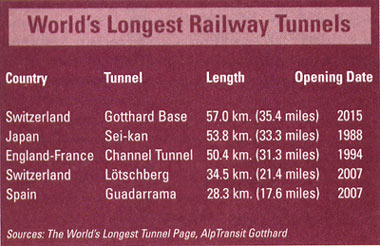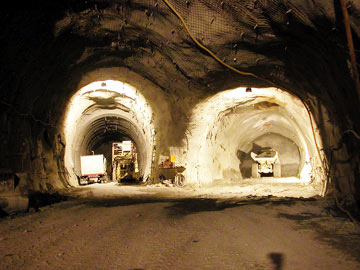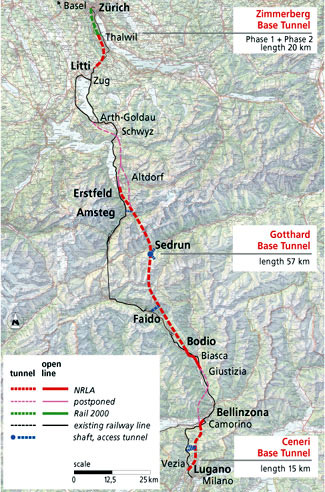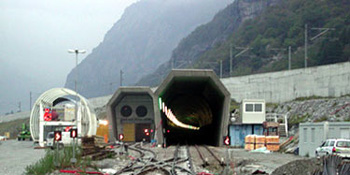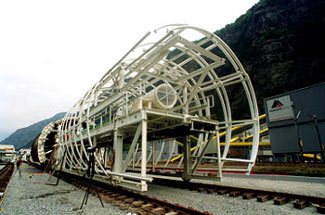|
Robust Times For Robotics
Automakers, New Applications Boost
Demand
Craig Jennings has
a problem most presidents of manufacturing companies would love to have:
Market growth for his products is so great that he’s constantly looking
at ways to boost capacity around the globe.
Jennings is president and COO of Motoman. Based
in West Carrollton, Ohio, Motoman specializes in robots for thermal applications,
material handling and coating and dispensing. A subsidiary of Japan’s
Yaskawa Electric Corp., Motoman has rapidly grown to be the second largest
North American robot company. Demand has forced Motoman to grow its production
capacity in the last few years by 50 percent, and more growth is needed.
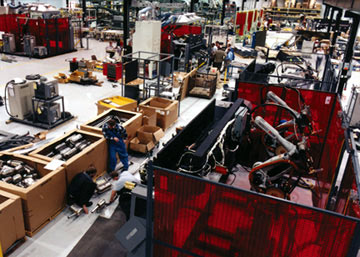 |
Motoman is expanding its robot manufacturing facilities
around the world. Rapid growth has made the Ohio-based company the
second largest producer of robots in North America. |
“We went from producing
just under 1,000 [robots] a month to 1,500,” Jennings says, adding that
the company needs to produce 1,800 per month to fulfill current orders.
Enabling the growth has been a major global expansion
program. Motoman expanded its facilities in China, Slovenia and Finland,
and just added a factory in Monterrey, Mexico. Closer to home, the company
has doubled capacity at its peripheral production facility in Mississauga,
Ontario.
The Monterrey facility will serve the food and
beverage, automobile and agriculture and construction markets with welding,
cutting and palletizing robots. Motoman supplies Tier 1 and Tier 2 auto
suppliers.
Jennings cites a lengthy laundry list of location
decision considerations. One key factor is the cost of money, which has
Motoman constantly moving production around the world.
“Currency is something you have to deal with,”
Jennings says. “We don’t want to go where the currency is strongest. That
will make it too expensive for weak currency nations to buy our robots.”
Jennings says the weak U.S. dollar may help bring
some of Motoman’s production back to Ohio. A few years ago, Motoman moved
some production out of Ohio to various offshore locations. Now, with more
capacity needed, the company’s facilities in West Carrollton and Troy may
be expanded.
“It doesn’t have to be Ohio, but we would likely
look there first because we have good relationships with local and state
government,” Jennings says. A prerequisite in any project is proximity to
customers. Other factors on the list include available infrastructure and
skilled workers as well as state and local incentives, he says.
The U.S. robot manufacturing industry developed
largely up and down the I-75 automotive corridor. Other applications developed
elsewhere, a major example being the semiconductor industry on both coasts.
In recent years, robotics industry growth has been powered by the growing
automobile and recreational vehicle manufacturing base in the Southeast.
“The Southeast has been very hot for automation,”
Jennings says. “It’s really driven a large surge in activity. The auto industry
uses robots for most everything and it continues to be a strong purchaser.
Usage in the food and beverage industry is increasing.”
The pharmaceutical and medical sectors, early
adopters of robotics, are also increasing their deployment of the technology,
Jennings says, noting that medical procedures figure to be a growing niche.
The exploding market for flat panel TVs and computer screens will be another
driver of growth, he says.
Robotics on a Worldwide Roll
Figures from the
Ann Arbor, Mich.-based Robotic Industries Association (RIA) mirror Moto-man’s
success story. RIA reports North American robotics companies logged a 13-percent
rise in new orders from the North American market through the first nine
months of 2004, selling 11,384 robots valued at US$745.1 million. North
American robot builders also sold 943 robots valued at $56.9 million during
that period to manufacturers outside of North America, a 185-percent gain
in units.
RIA estimates that about 142,000 robots are now
in use in the U.S. Material handling is the largest application area. Jennings,
a past president of RIA, estimates industry growth for 2005 will be in the
seven to 12 percent range.
The United Nations Economic Commission for Europe
(UNECE) in its World Robotics 2004 report says worldwide investment in industrial
robots rose 19 percent in 2003. The UNECE estimates at least 800,000 robots
are working in industry around the globe. Japan leads the way with 350,000,
followed by the European Union with 250,000 and North America with 112,000.
Germany dominates Europe with an estimated 112,700 units. |

